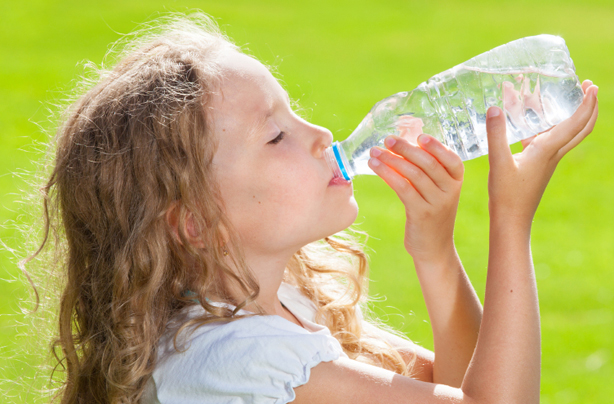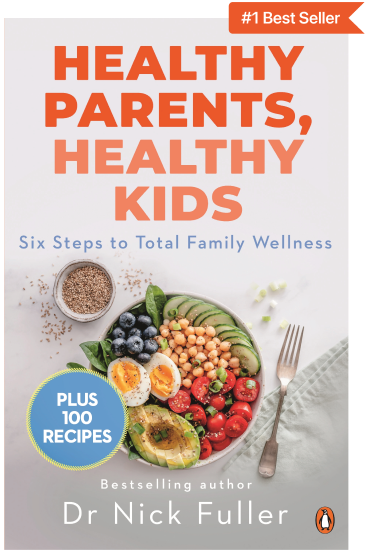Quick Tips to Get Kids Drinking Water More Often

Dr Nick Fuller
Leading Obesity Expert at the University of Sydney and founder of Interval Weight Loss.

Getting kids to drink enough water can sometimes feel like a mission, especially when juice boxes and soft drinks seem so much more exciting. But keeping little ones hydrated is essential for their health, mood and energy. Research in adults has shown that even mild dehydration can impair memory, focus, and mood. While the study was done in men, the findings highlight why keeping kids hydrated is just as important for their wellbeing.
With a few practical tweaks and fun ideas, you can make water their go-to drink without the fuss. Read on for practical tips and parent-approved strategies.
Keep Kids Hydrated With This Must-Read Book for Parents
If your child would rather sip juice or soft drink than water, Healthy Parents, Healthy Kids by Dr Nick Fuller can help. Packed with expert strategies for building healthier habits, this book gives parents practical ways to encourage kids to enjoy water, whether that’s with fun cups, fruity infusions, or clever mealtime routines.
Grab your copy of Healthy Parents, Healthy Kids today and make hydration a healthy, everyday habit at the dinner table and beyond.
Why Drinking Water is Essential for Kids
Water plays a big role in almost every function of the body. For kids, staying hydrated is especially important because they’re growing, learning and constantly on the move. According to that same research, here are the key benefits of getting the kids to drink water more often:
- Supports brain function – Even a small drop in hydration can affect attention and learning.
- Aids digestion – Water helps keep food moving smoothly through the digestive system.
- Keeps energy levels steady – Hydrated kids feel less sluggish and more ready to play.
- Regulates body temperature – Essential during sport or hot summer days.
- Prevents constipation – Adequate water keeps things regular.
Common Reasons Why Kids Avoid Water
If your child isn’t a fan of plain water, you’re not alone. Some of the most common reasons include:
- Preferring sweet drinks like juice or cordial – Kids often reach for sweeter options, making plain water seem boring in comparison.
- Not feeling thirsty until it’s too late – Children don’t always recognise early signs of thirst, so they miss chances to sip regularly.
- Disliking the plain taste – Water can feel ‘bland’ next to flavoured drinks, which makes it less appealing.
- Forgetting to drink during playtime – When kids are busy having fun, hydration is usually the last thing on their minds.
- Not having water as part of their daily routine – Without consistent habits, kids may simply not think to drink enough.
Causes of Dehydration
Kids lose fluids faster than adults, which means they’re more at risk of dehydration. Some common causes are:
- Hot weather – Extra fluid is lost through sweating, especially on summer days.
- Physical activity – Running, sports and active play burn through water stores quickly.
- Illness or fever – Fevers, vomiting or diarrhoea can rapidly deplete fluids.
- Not drinking enough fluids – Simply not sipping enough throughout the day leads to imbalance.
- Excessive sweating – High-energy kids or those in warm environments lose water more quickly.
Symptoms of Dehydration
Spotting dehydration early is important. Watch out for:
- Dry mouth – A lack of saliva is often the first sign.
- Fatigue – Low energy or unusual tiredness can signal fluid loss.
- Headache – Even mild dehydration may trigger head pain.
- Dark yellow urine – A clear sign the body needs more water.
- Dizziness – Feeling lightheaded is a red flag for dehydration.
How Much Water Should Kids Drink?
Guidelines can vary, but the Australian Government’s recommendations are a helpful starting point:
- Children up to 8 years old: 4-5 cups per day
- Adolescents: 6-8 cups per day
(One cup = 250 ml. These amounts don’t include water from foods like soup or fruit.)
10 Tips To Get Kids Drinking Water
Making water fun and part of everyday life is the best way to encourage kids to drink more:
1. Use fun bottles or cups
One study found that even adults drank more and rated snacks differently depending on whether they were given high-quality glasses or plain plastic cups. This shows how much presentation matters, and for kids, the right container can make water feel special. Bright bottles, cups with characters, or ones that change colour with temperature can turn water into a novelty. Also, reusable bottles are an eco-friendly choice.
2. Add fruit for natural flavour
If plain water feels too ‘boring’, try adding slices of lemon, berries, orange or cucumber. Infused water adds a splash of colour and taste without the added sugar of juice or cordial. This simple tweak matters because research shows that many children don’t drink enough water due to a lack of access or because they find it unpalatable. In fact, one study testing the effect of offering a flavoured beverage found that improving beverage appeal provided a small but measurable hydration benefit in children.
3. Set water reminders
Kids often forget to drink while playing. Setting small reminders, like a timer, app alert, or simply linking drinks to routine moments (before school, after sport, before bed), can help.
4. Keep water visible and ready
Out of sight, out of mind. Having a water bottle on the table, in the backpack, or by the bed means kids don’t have to ask or wait for you to serve them. Accessibility is key.
5. Be a water-drinking role model
Children mimic adult habits. If they see you regularly sipping water instead of soft drinks, they’re more likely to do the same. Family hydration can become a team effort.
6. Track intake with charts
Kids love rewards and progress charts. Use stickers, magnets or apps to track daily water goals. This turns hydration into a small, positive challenge they want to complete.
7. Offer water-rich snacks
Foods like watermelon, cucumber, oranges, and grapes naturally boost hydration. Research shows that about 20-25% of fluid intake typically comes from food. Pairing these with water makes a great hydration combo.
8. Use silly straws or shaped ice cubes
A curly straw or ice cubes shaped like stars and animals can make water exciting. Sometimes it’s the little details that encourage extra sips.
9. Give water first at meals
Offering water before juice or milk at mealtimes sets it as the default drink. Over time, kids start to expect and accept water as their go-to.
10. Let kids choose their bottle or flavour combo
Giving children a sense of ownership can make all the difference. Let them pick their water bottle or choose which fruit goes into their infused water. Kids are more invested when it feels like their choice.
Key Takeaway
Getting kids to drink more water doesn’t have to be a battle. With the right mix of creativity and consistency, you can turn hydration into a healthy habit they’ll stick with. Whether it’s fun bottles, fruity flavours or setting small daily goals, every sip counts towards helping your child stay energised, focused and healthy.
Struggling to get your child to enjoy healthy meals? Discover simple, creative tricks in The Role of Food Presentation in Child’s Appetite that can make food fun and irresistible.
Stay informed with fresh tips, expert guidance, unique deals, and tailored support!
Meet Dr Nick Fuller
My Story
As a father, I know first-hand that raising healthy and happy children is tricky. Children are fussy, particularly at the end of the day when they are shattered. We also live in a society where companies seek to profit from what we feed our kids; incorrect and damaging advice is pushed on us and marketed towards our children, and we have no time.
But with these recipes and resources, you and your children can enjoy simple and well-founded food and lifestyle choices for lifelong health.

About Dr Nick Fuller
Dr Nick Fuller is the founder of Interval Weight Loss and is a leading obesity expert at the University of Sydney with a Ph.D. in Obesity Treatment. Dr Fuller is also the author of three best-selling books and his work been published in top ranked journals in the medical field, including JAMA, Lancet and American Journal of Clinical Nutrition.
